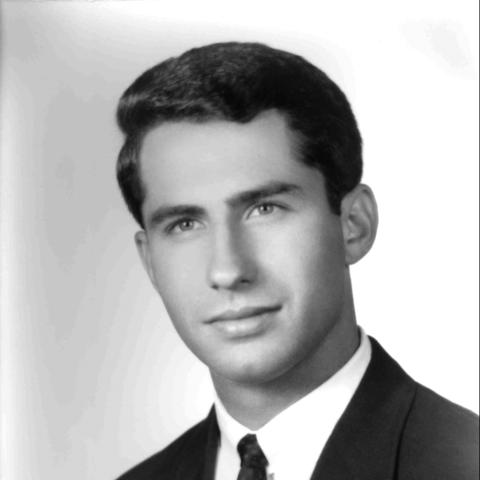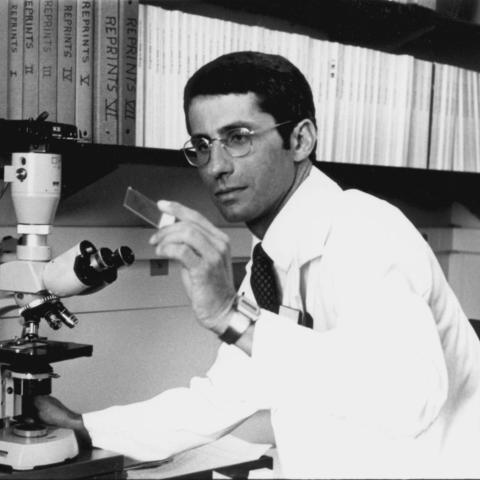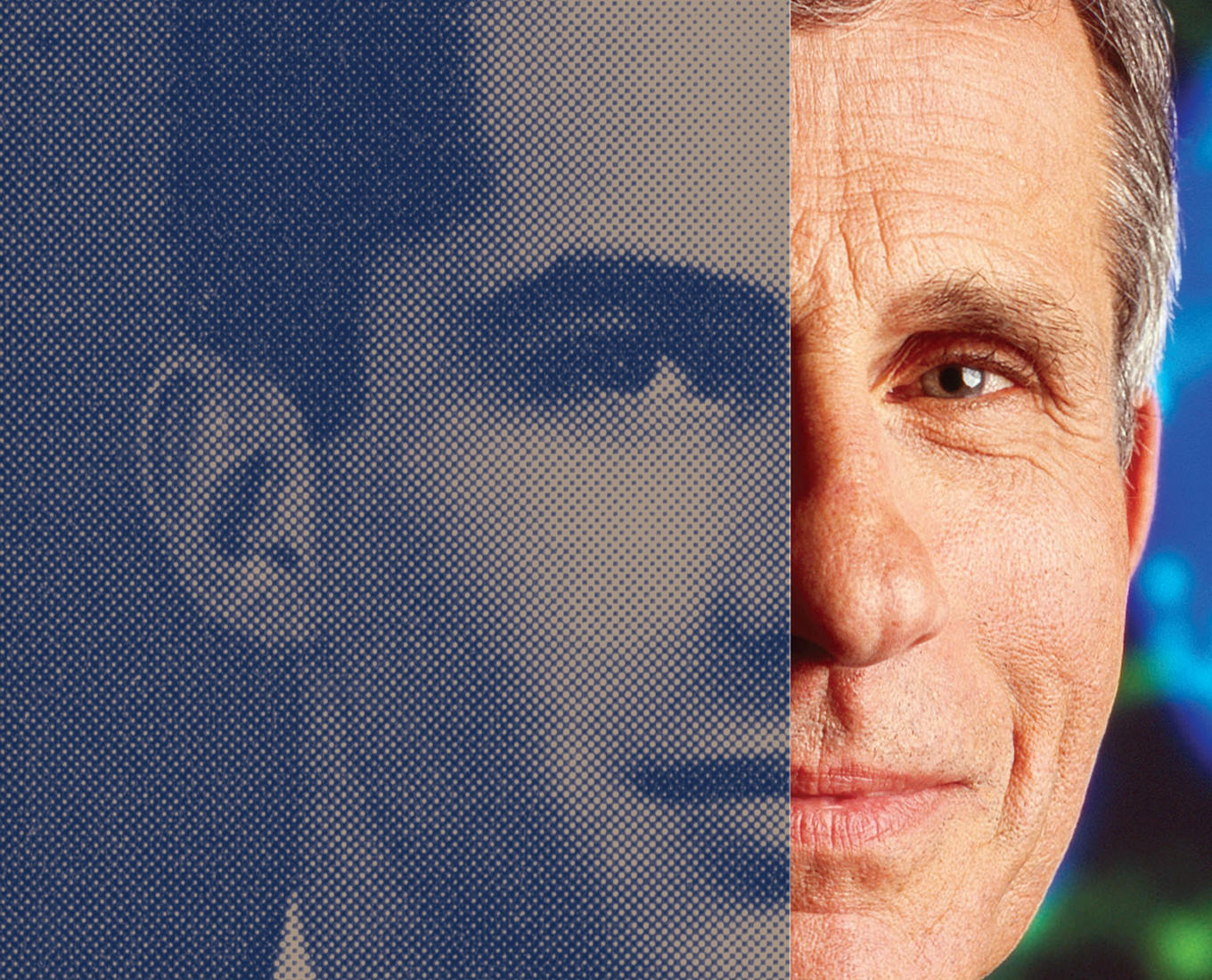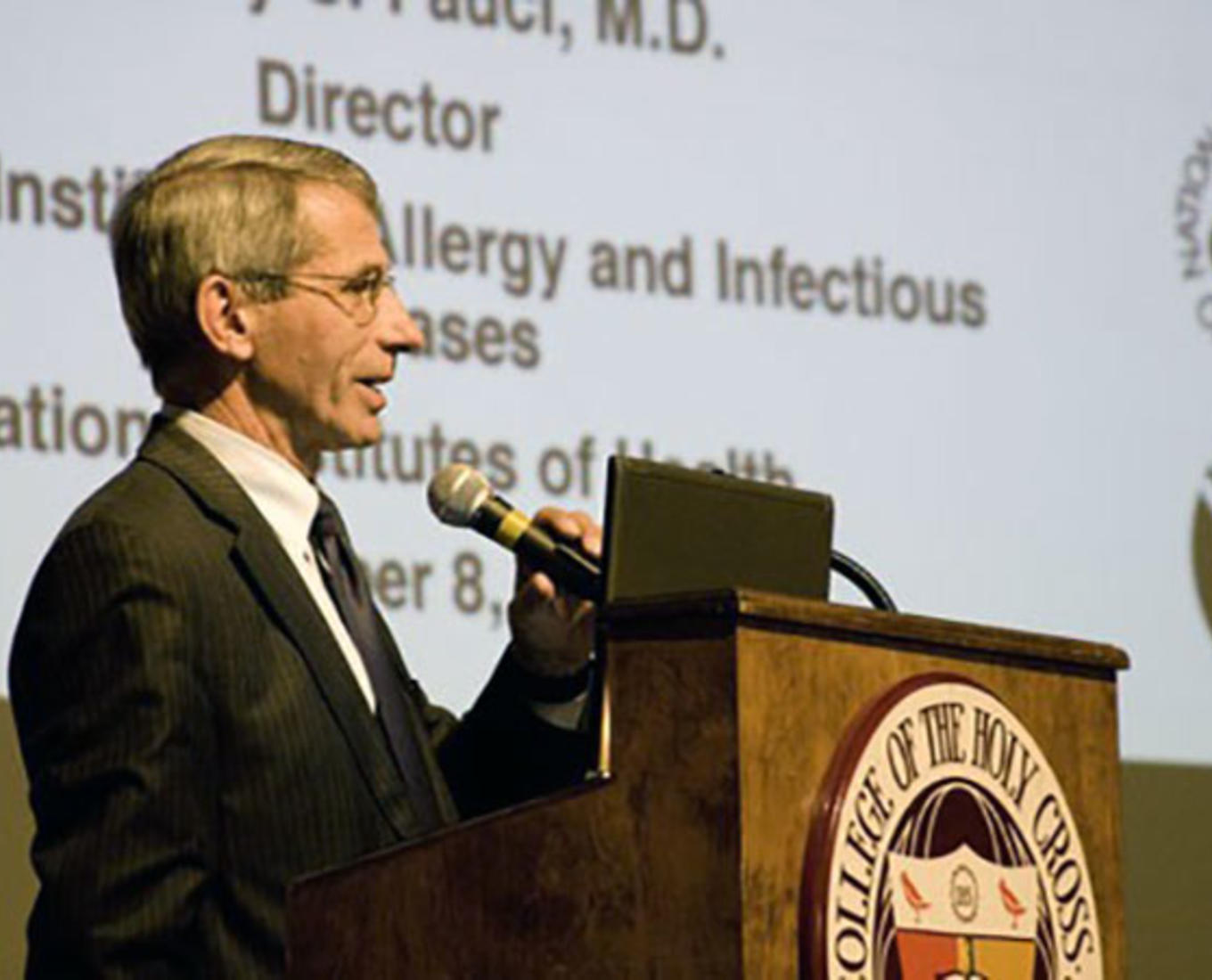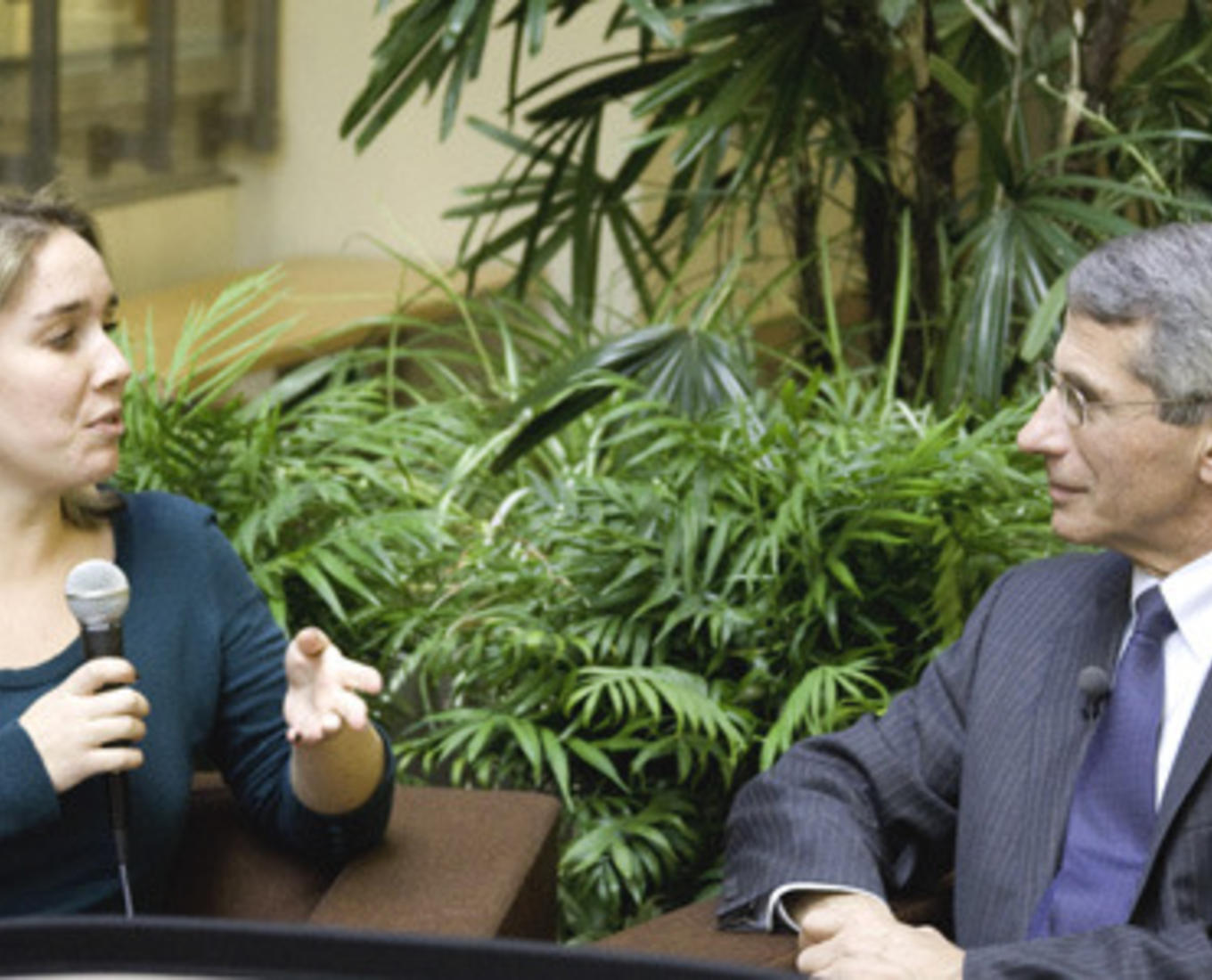Before the dedication ceremony of the Anthony S. Fauci Integrated Science Complex on June 11, the class of 1962 alumnus met with College of the Holy Cross students for a private conversation, answering a series of their questions, covering topics from his years on Mount St. James to career advice and more. This transcript has been lightly edited for clarity and length.
'Always stay open-minded': Anthony Fauci reflects on life after Holy Cross
Fauci sat with Holy Cross students reminiscing about everything from Wheeler Hall to his favorite book and standing up to a president of the United States.
Read Time
What is your favorite book to read for pleasure?
It’s very interesting. Before COVID, I would alternate; I would read about two books a month. I was doing a lot of traveling then as part of my responsibilities, which I don’t do much now. I would alternate between brainless spy novels on one hand and biographies and history on the other.
I’ve been reading biographies of Winston Churchill, of Andrew Jackson, of presidents and things like that. I like that just to get a feel for what other people have gone through, through crisis times. I never would have imagined in my wildest dreams when I went into medical school that I would be in a position I’m in right now. One of the big lessons I have learned, literally from the time I left here and went to medical school, is to expect the unexpected.
My entire career has been opportunities that I did not predict [and] I instinctively took that pathway. And then, here I am in a situation that if I was sitting on this campus a long, long time ago and somebody asked me, “Give me a prediction of where you think you would be,” I would have said I’d be practicing medicine in New York City on First Avenue and 68th Street, teaching and taking care of patients.
And I did that for a while. But that’s not what I’m doing right now, as you probably know. That has very little to do with the books I read, but I thought I would get that in anyway, in case you didn’t ask.
Where did you live on campus?
My freshman year, I was on the fourth floor at Wheeler. I walked up there [yesterday]. [When I was a student] there were four people in the room with two double bunk beds. I walked into the room [yesterday] and it looked like the size of a bathroom, and I was trying to figure out: How the heck did we fit four people in there?
I went from Wheeler, and then I went down, I think, to Alumni, which is close to Kimball. Then I went to one of the places that I forgot. Then in my fourth year, I was … is there a dorm called Hanselman? Yeah, that’s where I was in my senior year.
We all started Photoshopping you into the background of our photos and we called it Fauci Friday. For 10 weeks we did it religiously every single Friday. You became a legend here.
It’s a very interesting dichotomy in the country. I think it’s a little bit about me, but more about what I come to symbolize in an arena of lies and disinformation and distortion and conspiracy theories on the part of the extreme far-right, and because of the fact that I’ve stood up against the crazy president, that I’ve developed almost a cult of people who look to me for a representation and symbol of honesty and integrity. But there are about 30 million people in the country that want to see me dead, which is really strange. I was mentioning to President Rougeau why, when I give commencement addresses and I talk to students like yourselves, I almost plead with you: Don’t accept the complete normalization of lies because we’re in trouble if we do that.
When you are at your stage in your life you’ve got a lot of other things to worry about. You’re looking [at] your own career, your own future, a lot of things. But don’t shrug your shoulders and say it’s OK for people to look at the TV and the January 6 hearing and see on film what happened and then turn to another channel and there are millions of people watching that channel who are denying that it happened.
Doesn’t it scare you a little bit? It certainly scares me. I don’t expect everybody in the room to go out and march against that, but at least don’t personally accept it as normality because it’s egregiously abnormal. And what I find is that you get so fatigued by that, that you say, “I can’t be bothered with that.”
Don’t occupy all your time on that, just make sure deep down you don’t accept that that’s OK, because that really is not OK. Anyway, that’s my little preaching for the moment.
How did you navigate such a tumultuous time during COVID correlated with the rise of prejudice and misinformation?
It wasn’t easy. You really have to get anchored in your fundamental principles of integrity and realize that you have to be consistent with that. You can’t sway from fundamental core principles because of the stress around you. And if that means you’re going to have to give up something like your position – the worst people in government are the people who are so afraid of [losing] their jobs. So when you’re in a position of leadership in government and you have to guide yourself by core principles, you’ve got to be able to turn around and walk out at any given moment.
If you’re so wed to the pomp and circumstance of where you are, you’re going to slip and you’re going to probably compromise your integrity. I made the decision that every time I walk into the White House or I walk into the Congress and I talk, it may be the last time I ever do it because I may have to tell somebody an inconvenient truth that they didn’t want to hear, and then they shoot the messenger.
I’ve been the messenger a lot and I’ve gotten shot at, but it’s missed and the missing was during the Trump administration where I had to get up and do something that everybody thought was great, that I liked it. I didn’t like getting up in front of, you know, 100 million people and contradicting the president of the United States. I wasn’t comfortable about that. But I had to do it because if I didn’t do it, I would have been violating my own integrity and I would have been letting down the people in this country who I’m responsible for. I figured I might get fired. I mean, they couldn’t fire me for my job because I’m a public servant, but they could have kicked me out of the White House.
They didn’t, but what it did do is [it] generated tens of millions of enemies of mine who are completely distorted with conspiracy theories that are almost laughable.
But the answer to your question, short version, is that it isn’t easy but just stick by your principles. No job is worth compromising your integrity. No job in the world, period.
How did the intersectionality of studying classics while being on the pre-med track influence your time in medical school and becoming a doctor?
It was critical. It really was — and that’s not just lip service. I noticed the importance of my background here when HIV came along. When you start dealing with a group of people, young gay men who were totally disenfranchised, totally stigmatized against, you realize that disease is in a context, particularly public health issues. And then, all of a sudden, people and where they are in society and how society looks at them becomes more than just putting a stethoscope on somebody’s chest and listening. It becomes societal, in addition to scientific.
And then things really became steeped in what I learned in my classics course when it became clear that HIV was fundamentally a disease in lower-income countries, particularly in sub-Saharan Africa. You know, 95% of all HIV cases are in the developing world and 67% are in sub-Saharan Africa. A constrained part of the world has 67% of the cases.
It absolutely had a major impact on how I look at the world, how I look at an individual patient, too.
When I went to Africa multiple times, it became clear that there were things there that you wouldn’t even imagine: the inequities of health diseases that were commonplace, that would kill children, like malaria – 600,000 kids a year die of malaria. Nobody knows about it in the United States.
And then [there are] the disparities of health that get mixed up in racism and stigma, and it all becomes part of a big, big picture that’s part of the humanities. So it’s more than just the metabolic pathway to a beta-lactamase — it goes beyond that.
It absolutely had a major impact on how I look at the world, how I look at an individual patient, too. I mean, understanding what goes on in a patient’s mind, it’s more than just the case. It’s a human being. And when you understand that, it makes your job, I think, more fulfilling.
If you could do one thing differently concerning your medical career, what would it be?
I’m not really sure what I would have done differently. My big challenge: I made a decision when I took on the job of director of a big institute. I had to leave something on a daily basis that I was really, really good at and that I really, really liked. What I really miss is the challenge of day-by-day taking care of a very sick patient. Because I put a lot of years of training into doing that – four years of medical school, three years of residency, one year of chief residency, three years of fellowship. I’ve seen some of the sickest patients in the world, but nobody really knows that. They just know me as a guy who’s on television. I don’t know if I could have done anything different because I couldn’t do both. I can’t be responsible for patients in Bethesda at our hospital when I’m doing things like I’m doing right now. That’s the thing I wouldn’t say I would have done it differently, but that’s the thing I miss the most.
As someone who’s been at the forefront of the fight against HIV/AIDS, is there any advice or something important that you learned that you pass along to someone going into that field from college?
One of the things that sticks out in my mind is, particularly at your stage, try to pick out something that you’re passionate about, not something that somebody else thinks is important. It’s amazing how, if you look at all the people that I’ve been involved with in my career — both purely scientifically as well as medically — there are different strokes for different folks. There really are. Somebody [may be] passionate about one thing and you think, “Why would I want to waste my time on that?” You shouldn’t demean it because somebody else really gets passionate about it. Pick out something that really turns you on, fully knowing that you may change your mind along the way.
And that happens a lot. For those who are going to go into medicine, when you go to medical school, you learn a lot of the technical stuff and then you start to see patients. And the first time somebody allows you to do something, you’re going to fall in love with that specialty.
Now I wouldn’t want to deliver a baby for sure — ever again — but I loved it then.
When I was in medical school, my first rotation clinically was ob-gyn. I found myself, a 24-year-old medical student, delivering a baby. It was the most incredible thing in the world. Now I wouldn’t want to deliver a baby for sure — ever again — but I loved it then.
Go with your passion. When I first started at the NIH, I was involved in looking at the antigenic competition: When you give two separate antigens to an animal, is there any preferential response to one versus the other? And what’s the regulatory mechanisms associated with that? [This] was a good fundamental, basic foundation for my going into immunology and infectious diseases. As it turned out, my real love turned out to be infectious diseases. [But] I didn’t start out doing that at all.
What’s your favorite memory at Holy Cross?
I have one stark memory that is not a favorite memory. It’s going down from Wheeler to the library. I was walking with Fr. [Alfred] Desautels, S.J. Does anybody remember Fr. Desautels? He was the French professor. We were walking down during typical midwinter Worcester weather, and he slipped on the ice on the stairs, and I went to grab him to help him. We both fell down those long stairs on the ice. Both of us were banged up and we became great friends after that because we had that experience.
You know, I don’t think there’s one thing. It was mostly the friends that I developed and I saw. I saw a few of them last night at the class of ’62 reunion, and it was really very, very moving to see [them].
Can you walk us through that progression and some of the decisions you made in navigating your career path? Do you have any advice for us as we approach that same process?
I mentioned it in one of the comments I made a little while ago: Always stay open-minded and really expect the unexpected because things happened in front of me that completely changed the direction of my career.
I went to medical school with the thought of going back to New York and practicing medicine, and when I came to the NIH, I really wanted to use that as a three-year fellowship, get it over with and go back to New York and practice medicine. And then, all of a sudden, I started to really become enchanted and enamored with this concept of clinical research, where instead of one individual patient that you take care of, you do a study that can impact large numbers of patients.
So I did that for a bunch of years, and I was very successful at a very young age. I was very lucky. I had a very, very generous mentor who put me on a project that was a real home run from the very beginning. I added a bit of creativity to it, but if it wasn’t for his generosity, I would not have been as successful.
I was doing that for about nine years, and I was on kind of a very comfortable career pathway thinking that I would just go along and do all these things. Then, in 1981, this strange new disease came along among young gay men and we didn’t know it was. I made a decision at that point to do something that my mentors said was a mistake: I completely changed the direction of my career. I instinctively said, “Wait a minute, this is a brand-new disease, could I actually be experiencing a brand-new disease? That doesn’t happen. Where in the history books are there brand-new diseases?” And it turned out it was. I made a very fateful decision to change the direction of my research and, again, my mentors thought I was nuts: Why are you throwing away a trajectory of a career that’s so successful? I started taking care of these scores of young gay men, all of whom were on the verge of death because they had been probably infected for 10 years and didn’t know it.
I did that for three or four years in a row, just doing nothing but trying to squeeze in some research. And then we found out what the virus was, we developed drugs and we turned around an otherwise-deadly disease to become a totally manageable disease. That led me to prominence enough to be offered the job as director of the institute, which I didn’t want.
I really did not want to be a director of anything. I just wanted to take care of patients. And I said, “Well, maybe if I become the director of the institute, I could have more of a global impact on infectious diseases.” And I did. I took the job under the condition that I’d be able to continue to do some of the things I was doing.
That opened up for me the total vista of global health, international health and the things I’m doing now. So the lesson is that if I had strictly gone on the linear pathway I thought I was on, as opposed to this, I wouldn’t be speaking to you here right now. I would probably be in New York, retired or something.
But I’m not, I’m here. And it was really what’s called the flexibility of expecting the unexpected and being able to make a move, so I always keep an open mind.
What led you to be a classics major at Holy Cross?
When I graduated from Regis High School, I wanted to do pre-med. And, believe it or not, you’re not going to believe this, but it’s true. Back then, this is 1958: If you went to a Catholic Jesuit school in New York City, they would almost not allow you to go to anything other than a Catholic school for college.
They wouldn’t even send your transcripts to Cornell or Columbia or anything like [that]. They said, “What do you want to do?” I want to go pre-med. “The best pre-med in the world, as far as we’re concerned, is Holy Cross,” which actually it was. Pre-med for Holy Cross back then, and probably now — not only among Catholic schools, but among any school in the country — [was] phenomenal. And there were two possibilities that you could do: classics or straight science, pre-med.
The reason I took the classics course is that I really felt that if I were just to jump into the science, I didn’t feel – I was 17 at the time – that I had enough experience in other things beyond science, and I wanted to learn a little bit more about civilizations, ancient history [and] all the things that you are learning right now.
And it was really not only a very good choice, but at the end of the day, from the standpoint of what I ultimately wound up doing with my life, it was absolutely essential. Because there’s nothing wrong with people who are completely strict science, calculus, physics and all that sort of stuff. But there was a certain something that I got out of the classics that made me appreciate the world I found myself in and the world I’m in right now.
I don’t think I’d be able to understand very well the cultures in sub-Saharan Africa and in South America and the Caribbean that are very, very much part of my world now because of the diseases they have. I don’t think I would have been able to understand that as well if I did something less than what I did in the classics. So it was a good choice.
